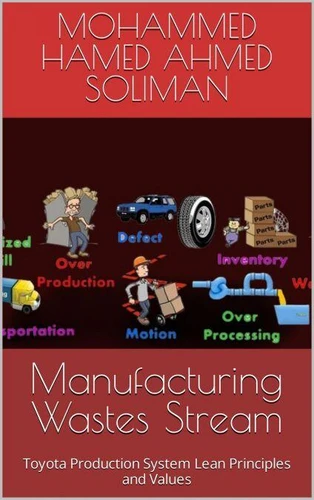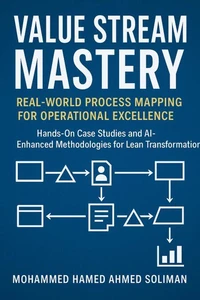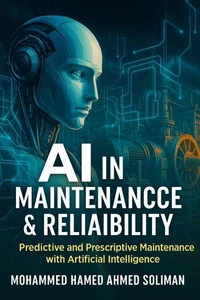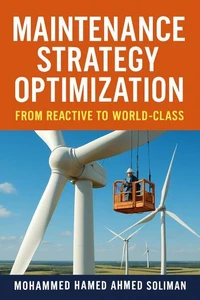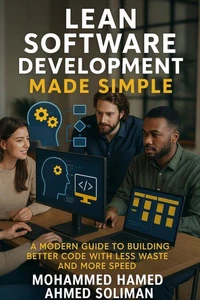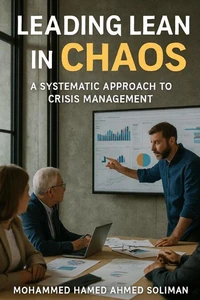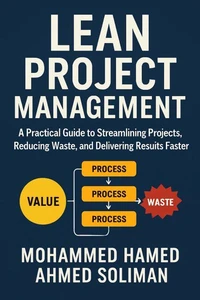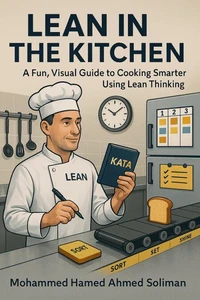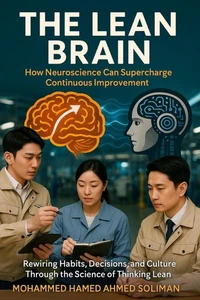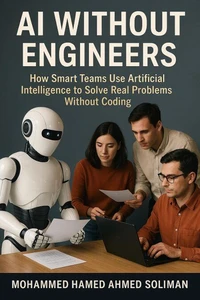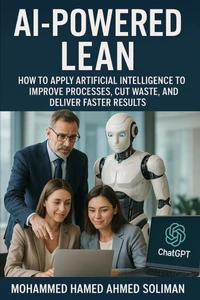Manufacturing Wastes Stream: Toyota Production System Lean Principles and Values
Par :Formats :
Disponible dans votre compte client Decitre ou Furet du Nord dès validation de votre commande. Le format ePub protégé est :
- Compatible avec une lecture sur My Vivlio (smartphone, tablette, ordinateur)
- Compatible avec une lecture sur liseuses Vivlio
- Pour les liseuses autres que Vivlio, vous devez utiliser le logiciel Adobe Digital Edition. Non compatible avec la lecture sur les liseuses Kindle, Remarkable et Sony
- Non compatible avec un achat hors France métropolitaine
 , qui est-ce ?
, qui est-ce ?Notre partenaire de plateforme de lecture numérique où vous retrouverez l'ensemble de vos ebooks gratuitement
Pour en savoir plus sur nos ebooks, consultez notre aide en ligne ici
- FormatePub
- ISBN8215632413
- EAN9798215632413
- Date de parution03/10/2022
- Protection num.Adobe DRM
- Infos supplémentairesepub
- ÉditeurWMG Publishing
Résumé
Eliminate the Hidden Costs Dragging Your Business DownWhat if the biggest losses in your company weren't in the balance sheet-but in everyday operations?This book reveals the Seven Deadly Wastes (Muda) defined in the legendary Toyota Production System (TPS)-and shows you how to find and eliminate them in any organization. Whether you work in manufacturing, logistics, services, or healthcare, these wastes silently kill productivity, profits, and morale.
You'll learn: What each of the seven wastes is costing your business How to detect hidden inefficiencies in your value stream Proven strategies from TPS to eliminate each waste Why cost-cutting layoffs won't work-and what sustainable improvement looks like How to shift your organization toward a culture of continuous improvement Packed with practical insights and real-world logic, this book is your roadmap to lower costs, higher efficiency, and long-term success. More about this Book:In order to cut costs during the economic downturn, many businesses are implementing abstinence policies.
This could mean laying off workers and cutting some wages. In fact, those actions might only work for a short time. Unless the company implements a culture of continuous improvement and alters its method of operation, the situation may recur and become even worse. This brings us back to the purpose for which the Toyota production system was developed. Waste is anything that uses resources but offers the customer nothing in return.
Most activities are waste, or "muda, " and can be divided into two categories. Although type one muda does not provide value, it is inescapable given the production assets and technologies available today. An illustration would be checking welds for safety, that type we also call necessary non-value-added activity. Type two muda does not add value and can be quickly eliminated. An illustration is a process in a process village with disconnected phases that may be swiftly converted into a cell where unnecessary material moves and inventory are no longer necessary.
A very small portion of all value-stream activities truly generate value as perceived by the client. The most effective way to boost business performance is to stop doing the numerous unnecessary things.
You'll learn: What each of the seven wastes is costing your business How to detect hidden inefficiencies in your value stream Proven strategies from TPS to eliminate each waste Why cost-cutting layoffs won't work-and what sustainable improvement looks like How to shift your organization toward a culture of continuous improvement Packed with practical insights and real-world logic, this book is your roadmap to lower costs, higher efficiency, and long-term success. More about this Book:In order to cut costs during the economic downturn, many businesses are implementing abstinence policies.
This could mean laying off workers and cutting some wages. In fact, those actions might only work for a short time. Unless the company implements a culture of continuous improvement and alters its method of operation, the situation may recur and become even worse. This brings us back to the purpose for which the Toyota production system was developed. Waste is anything that uses resources but offers the customer nothing in return.
Most activities are waste, or "muda, " and can be divided into two categories. Although type one muda does not provide value, it is inescapable given the production assets and technologies available today. An illustration would be checking welds for safety, that type we also call necessary non-value-added activity. Type two muda does not add value and can be quickly eliminated. An illustration is a process in a process village with disconnected phases that may be swiftly converted into a cell where unnecessary material moves and inventory are no longer necessary.
A very small portion of all value-stream activities truly generate value as perceived by the client. The most effective way to boost business performance is to stop doing the numerous unnecessary things.
Eliminate the Hidden Costs Dragging Your Business DownWhat if the biggest losses in your company weren't in the balance sheet-but in everyday operations?This book reveals the Seven Deadly Wastes (Muda) defined in the legendary Toyota Production System (TPS)-and shows you how to find and eliminate them in any organization. Whether you work in manufacturing, logistics, services, or healthcare, these wastes silently kill productivity, profits, and morale.
You'll learn: What each of the seven wastes is costing your business How to detect hidden inefficiencies in your value stream Proven strategies from TPS to eliminate each waste Why cost-cutting layoffs won't work-and what sustainable improvement looks like How to shift your organization toward a culture of continuous improvement Packed with practical insights and real-world logic, this book is your roadmap to lower costs, higher efficiency, and long-term success. More about this Book:In order to cut costs during the economic downturn, many businesses are implementing abstinence policies.
This could mean laying off workers and cutting some wages. In fact, those actions might only work for a short time. Unless the company implements a culture of continuous improvement and alters its method of operation, the situation may recur and become even worse. This brings us back to the purpose for which the Toyota production system was developed. Waste is anything that uses resources but offers the customer nothing in return.
Most activities are waste, or "muda, " and can be divided into two categories. Although type one muda does not provide value, it is inescapable given the production assets and technologies available today. An illustration would be checking welds for safety, that type we also call necessary non-value-added activity. Type two muda does not add value and can be quickly eliminated. An illustration is a process in a process village with disconnected phases that may be swiftly converted into a cell where unnecessary material moves and inventory are no longer necessary.
A very small portion of all value-stream activities truly generate value as perceived by the client. The most effective way to boost business performance is to stop doing the numerous unnecessary things.
You'll learn: What each of the seven wastes is costing your business How to detect hidden inefficiencies in your value stream Proven strategies from TPS to eliminate each waste Why cost-cutting layoffs won't work-and what sustainable improvement looks like How to shift your organization toward a culture of continuous improvement Packed with practical insights and real-world logic, this book is your roadmap to lower costs, higher efficiency, and long-term success. More about this Book:In order to cut costs during the economic downturn, many businesses are implementing abstinence policies.
This could mean laying off workers and cutting some wages. In fact, those actions might only work for a short time. Unless the company implements a culture of continuous improvement and alters its method of operation, the situation may recur and become even worse. This brings us back to the purpose for which the Toyota production system was developed. Waste is anything that uses resources but offers the customer nothing in return.
Most activities are waste, or "muda, " and can be divided into two categories. Although type one muda does not provide value, it is inescapable given the production assets and technologies available today. An illustration would be checking welds for safety, that type we also call necessary non-value-added activity. Type two muda does not add value and can be quickly eliminated. An illustration is a process in a process village with disconnected phases that may be swiftly converted into a cell where unnecessary material moves and inventory are no longer necessary.
A very small portion of all value-stream activities truly generate value as perceived by the client. The most effective way to boost business performance is to stop doing the numerous unnecessary things.

